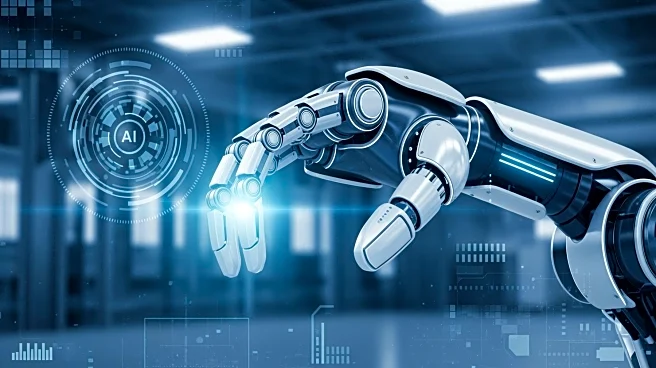What's Happening?
Doosan Robotics has been recognized with two CES Innovation Awards for its Scan & Go Autonomous Robotic Solution. The awards, presented by the Consumer Technology Association, highlight outstanding design
and engineering in technology products. The Scan & Go solution, developed in collaboration with Maple Advanced Robotics Inc., is an AI-powered system designed to revolutionize large-scale manufacturing and composite repair. It utilizes cognitive learning and 3D perception to interpret complex geometries and generate optimized tool paths, eliminating the need for CAD modeling and code programming. The system is mounted on a self-driving forklift and autonomously navigates and operates across large structures, performing tasks such as sanding, grinding, and inspection with minimal preparation.
Why It's Important?
The recognition of Doosan Robotics at CES 2026 underscores the growing importance of AI-driven solutions in industrial settings. The Scan & Go system offers significant benefits, including faster production cycles, reduced labor costs, improved quality, and enhanced safety. By automating hazardous and labor-intensive tasks, the solution addresses critical challenges faced by workers, such as noise, fine dust, and repetitive strain. The awards highlight Doosan Robotics' commitment to advancing AI technology and its potential to transform industries by improving efficiency and safety standards.
What's Next?
Doosan Robotics plans to expand its portfolio of AI robotic solutions in the coming year, aiming to address real-world challenges in industrial environments. The company is focused on deploying solutions that deliver immediate results on-site, aligning with its strategic transformation into an AI robotic solutions provider. The debut of its AI solutions at CES 2026 marks a significant milestone in its journey to strengthen global technological competitiveness and secure future growth engines.
Beyond the Headlines
The development of AI-powered robotic solutions like Scan & Go reflects broader trends in automation and the integration of advanced technologies in manufacturing. These innovations have the potential to reshape labor markets, enhance productivity, and redefine safety standards in various industries. As companies increasingly adopt AI-driven systems, ethical considerations regarding workforce displacement and the need for reskilling may arise, prompting discussions on the future of work in automated environments.








